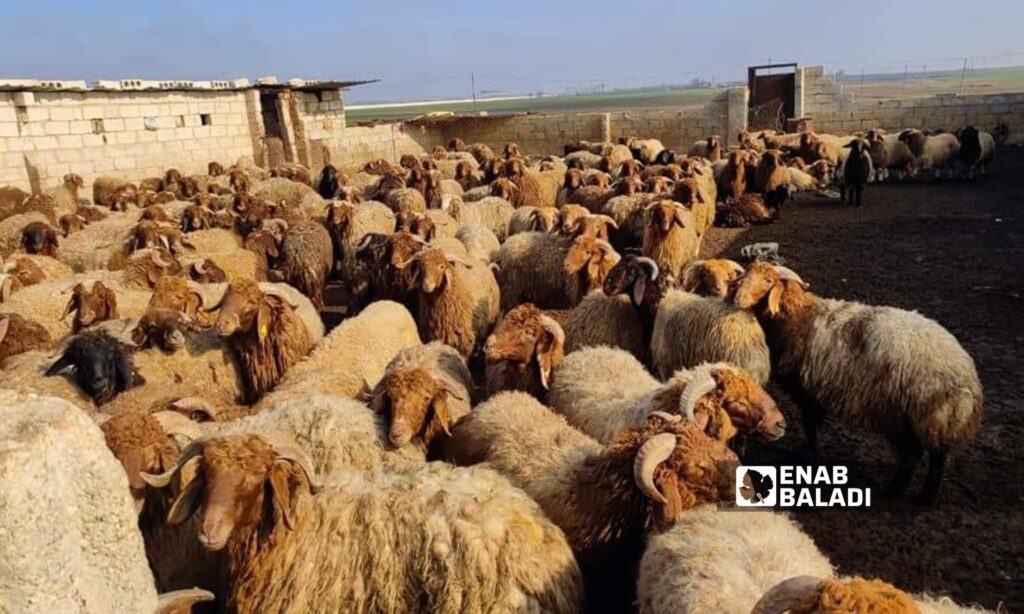Ras al-Ain – Hussein Shaabo
Livestock breeders in the border Ras al-Ain region, northwest of al-Hasakah city, suffer from high prices and shortages of veterinary medicines, which threatens the livestock and incurs huge losses to breeders if they continue to work or even if they sell their livestock.
The region is located between the Turkish border and the areas controlled by the US-led Syrian Democratic Forces (SDF), and there are no official crossings between them. The Kurdish-led forces impose a siege on the region, and it also imposes royalties with the Syrian regime on entering materials, including veterinary medicines.
Scarce and expensive medicines
Majed al-Badrani, a sheep breeder in Ras al-Ain, told Enab Baladi that his sheep are in constant need of veterinary medicines, especially medicines for poisoning and liver worms that affect them, pointing out that the medicines are very few and at exorbitant prices.
Al-Badrani explained that the price of an injection to treat poisoning, if available, is 60,000 Syrian pounds, noting that he owns 120 sheep, and under these circumstances, he will be forced to sell half of them to preserve the rest. ($1=12,900 SYP)
For his part, Sultan al-Jarad, another livestock breeder from Ras al-Ain, said that the shortage of veterinary medicines threatens livestock breeders with bankruptcy, as they are forced to buy medicines at high prices, and sometimes they cannot find them, and some of them sometimes turn out to be corrupt and expired after purchasing them, adding he had to sell 30 of the 70 sheep he had.
Veterinary medicines in the city of Ras al-Ain, northwest of al-Hasakah – September 8, 2023 (Enab Baladi/Hussein Shaabo)
Royalties and falsification of validity
The veterinarian in Ras al-Ain, Hussein Ibrahim, told Enab Baladi that the region is constantly suffering from a shortage of veterinary medicines and high prices, and this is mainly due to the royalties imposed by the regime forces and SDF fighters on medicines entering the region.
He stated that the royalties reached 50% of the price of the medicine, which raises the prices of medicines significantly and makes them unaffordable for livestock breeders.
Regarding the presence of expired medicines in the area, the doctor said, “We also face another challenge, which is the arrival of expired veterinary medicines to Ras al-Ain, as the expiration dates of some of these medicines are changed in Raqqa before their arrival, which puts the health of the animals at risk.”
Ibrahim added that the most prominent medicines that are almost missing are artificial insemination straws (syringes), pointing out that cows are missing an important means of reproduction and that the lack of basic medicines has led to a sharp decline in the number of cows, as there were about 2,000 cows in the region a year ago, but this number decreased to 1,150.
Promises to provide Turkish medicine
Omar Hammoud, head of the Agriculture Office in the Ras al-Ain Local Council, told Enab Baladi that the number of sheep in the region is about 130,000, in addition to 1,150 heads of cows.
He pointed out that the main reason for the interruption of veterinary medicines is the lack of official trade routes between the region and the areas adjacent to it that are under the control of the SDF and the Syrian regime.
Hammoud stated that farmers in the region rely on smuggling methods to deliver veterinary medicines to the region, which come at high prices and are often corrupt.
He added that the Agriculture Directorate in Ras al-Ain is communicating with the Turkish side to secure Turkish veterinary medicines “with the aim of preserving the remaining livestock in our region.”
Hammoud’s estimates indicate that the number of dead sheep reached about 100,000, parts of agricultural lands were desertified, and irrigation wells dried up, according to Hammoud.
Livestock and agricultural wealth in Ras Al-Ain suffered significant losses as a result of the drought that struck the region in the previous two years, and agriculture and livestock raising are two economic activities that the population in the region mainly depends on.

